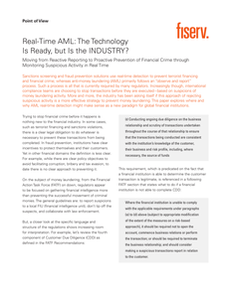Sanctions screening and fraud prevention solutions use real-time detection to prevent terrorist financing and financial crime; whereas anti-money laundering (AML) primarily follows an “observe and report” process. Such a process is all that is currently required by many regulators. Increasingly though, international compliance teams are choosing to stop transactions before they are executed – based on suspicions of money laundering activity. More and more, the industry has been asking itself if this approach of rejecting suspicious activity is a more effective strategy to prevent money laundering. This paper explores where and why AML real-time detection might make sense as a new paradigm for global financial institutions.

